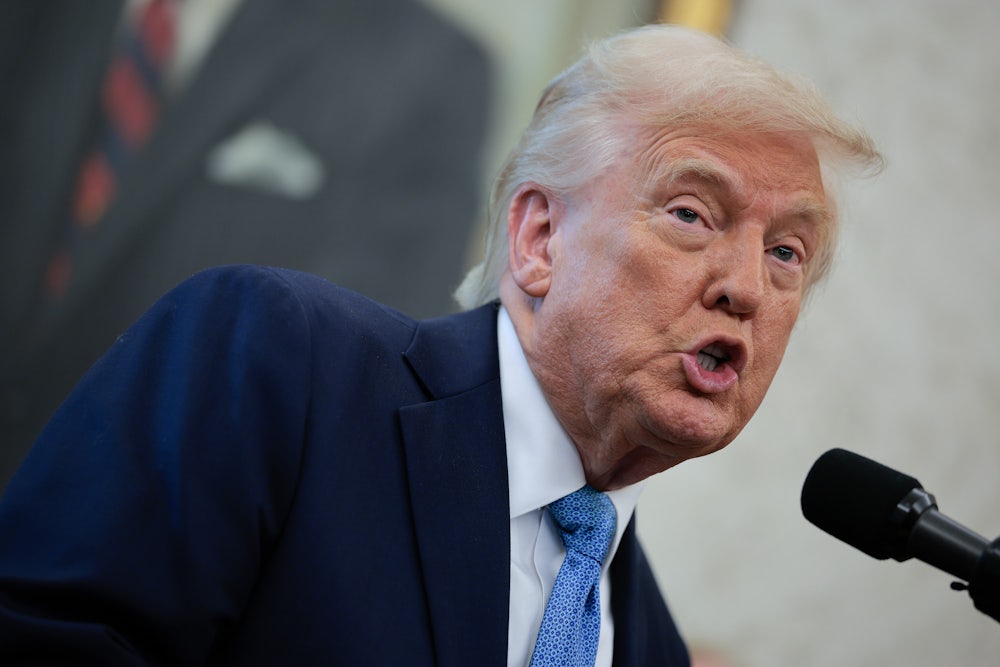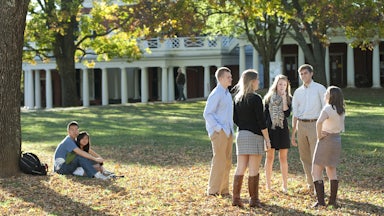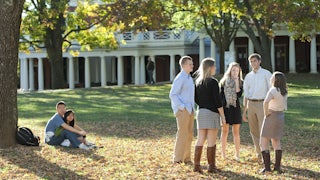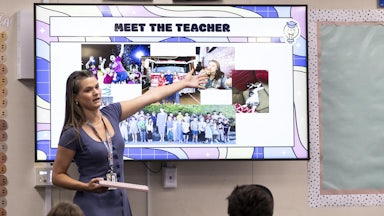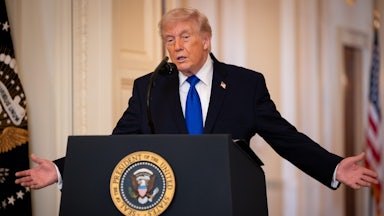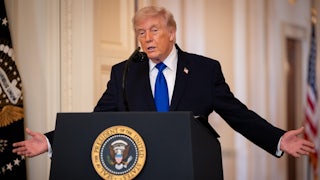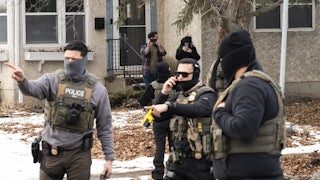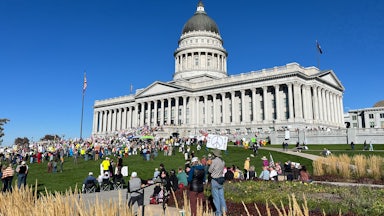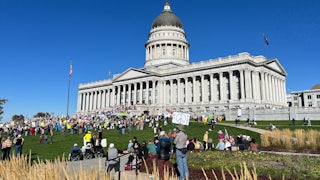On campuses across the country this spring, international students are watching the plans they’ve made for the future come under threat. Hundreds of students have received emails telling them to immediately “self-deport” after their visas had been revoked for campus activism. Others learned from their universities that their student visa records had quietly been terminated. Union organizers report that students are afraid to attend meetings, let alone participate in protests. And behind it all is a mounting fear that the university—the place they came to learn, work, and call home—has turned against them.
For decades, the United States has maintained a dominant position in global university rankings. American schools have long marketed themselves as open arenas for ambitious minds across the world, in which cultural diversity and scholarly freedom fuel innovation. But that well-worn image is now starting to crack.
In recent months, foreign students—particularly those participating in pro-Palestine protests—have had their student visas threatened or have been detained and placed in deportation proceedings, signaling a sharp and politically charged shift in federal policy. At the same time, public and private research universities, which depend heavily on international students’ tuition and labor—especially in science, technology, engineering, and mathematics disciplines—are facing the erosion of a vital economic pillar. These developments threaten not only the foundational rights of free speech and academic freedom but also the financial stability of the institutions that anchor the U.S. higher education system and conduct the vital research on which the future will be built.
In March, the State Department revoked 300 visas of students involved in activism. By April, more than 4,700 students’ names were removed from the Department of Homeland Security–run Student and Exchange Visitor Program, or SEVIS, database—a post-9/11 system that tracks visa compliance—triggering legal confusion and widespread fear. The purge spawned a legal firestorm with more than 40 federal judges issuing emergency injunctions, forcing the Trump administration to abruptly reverse course. In a federal court hearing later that month, the Trump administration confirmed that it generated the list by running the names of 1.3 million international students through a federal criminal records database. The overwhelming majority of the supposed “hits” were tied to minor infractions like traffic violations or dropped charges. The United States Citizenship and Immigration Services then announced it would start screening immigrants’ social media activity for antisemitism.
The message has been unmistakably clear. “We are not going to be importing activists into the United States,” Secretary of State Marco Rubio said in March, defending the crackdown. Among others targeted for protesting are Mahmoud Khalil, a Palestinian student leader at Columbia, and Rümeysa Öztürk, a Tufts graduate student who was abducted by plainclothes agents in an unmarked vehicle after co-authoring an op-ed about the genocide in the student paper.
Far from isolated incidents, these cases reflect an emerging strategy—leveraging immigration enforcement as a tool of political suppression. International students have become an ideal scapegoat: politically vulnerable, culturally diverse, and often outspoken. Immigration officials now claim broad authority to revoke visas for “supporting terrorism,” using vague, expansive definitions. The result is a chilling effect on campus expression and a stark warning to those who would protest U.S. policy.
For academic leaders like Todd Wolfson, president of the American Association of University Professors, the strategy is transparent. “They want to undermine higher education and also heighten the new Cold War on campus,” Wolfson said.
The crackdown on international students sits at the intersection of two of Trump’s long-standing goals: to rid the country of foreigners and to weaken institutions that challenge his authority, especially universities. Higher education has always been a thorn in Trump’s side—a site of liberal values, multiculturalism, and dissent. By targeting international students, his campaign can strike at both immigration and academia in one blow, purging the university of its global character while feeding a nativist base eager to see elites punished.
Trump has also used international students as leverage in his broader campaign against higher education by threatening to ban foreign students from Harvard if the university didn’t comply with a list of demands. By weaponizing visa policy in this way, the administration is sending a clear message—universities that fail to align with the political agenda of the right risk losing both their students and their autonomy.
This isn’t the first time international students have been caught in the crosshairs of U.S. geopolitical anxieties. In 2020, the Trump administration abruptly canceled 1,000 visas belonging to Chinese students, citing alleged ties to the Chinese military and accusing some of stealing sensitive research. Although the Biden administration ultimately ended the controversial “China Initiative” in 2022, it kept the program in place for a year. Upon returning to office, Trump promptly reinstated it—a move aligned with the goals outlined in Project 2025. In March, the House Select Committee on the Chinese Communist Party sent letters to six universities demanding information on Chinese students and faculty, reviving Cold War–style fears about espionage and foreign influence. “America’s student visa system has become a Trojan horse for Beijing,” the letter warned, claiming Chinese nationals had “unrestricted access” to top research institutions and posed a direct threat to national security.
The stakes go beyond free speech and academic freedom. Attacks on international students also imperil the financial viability of universities, many of which have come to rely heavily on the undergraduate tuition revenue, research, and labor provided by foreign students. “The dirty little secret of these public schools that nobody wants to talk about is that they have financially added revenue after the decline of state support through undergraduate international students, principally from China because they charge them a really high amount to attend,” said the vice president of a large state university’s graduate student union. He was part of a class-action effort to restore SEVIS registrations before the administration reversed course late last month. (He has asked not to be named in order to avoid potential retaliation.)
A 2016 study in the American Economic Journal found that between 1996 and 2012, a 10 percent cut in state appropriations resulted in a 16 percent increase in foreign enrollments at public research universities. Since the 1980s, foreign student enrollments have more than tripled, with the largest share coming from China. Today, the U.S. educates over one million international students a year.
The student union vice president’s school system, like many others, opened recruiting offices in China decades ago in a bid to attract the incomes of upper-middle-class families who were willing to pay full tuition. Without international students, he warned, the university would “collapse very quickly”—not just in terms of undergraduate tuition but also in terms of research output and academic operations. “Basically all the medical research wouldn’t happen because all the postdocs would disappear,” he said.
The U.S. hosts more international students than any other country in the world, and the majority of them are graduate students who play essential roles in both teaching undergraduates and driving research. At institutions like Columbia University—home to over 23,000 international students, faculty, researchers, and visiting scholars from 162 countries—the presence of global talent is foundational to academic life. More than half of all international students nationwide are enrolled in STEM programs, where they contribute to critical scientific research and technological innovation. Many remain in the U.S. after graduation, helping to launch start-ups, develop scientific and technological breakthroughs, and sustain the country’s role as a global leader in innovation and discovery.
The chilling effect on graduate student organizing has been swift. According to the union representative, some international students are now afraid to even meet privately with union organizers, fearing that any association could jeopardize their visa status or lead to deportation. These fears are not isolated. The wave of crackdowns is reportedly already deterring many prospective students from applying to U.S. institutions. As a result, the country’s long-held status as the global standard-bearer for higher education is under threat, undermined by policies that treat international students not as scholars but as political liabilities.
What makes this crackdown particularly insidious is how seamlessly it folds into a broader reactionary offensive against protest itself. Wolfson fears that threats to international students will soon extend to international faculty as well. But the deeper objective, he argues, is larger still: “What’s much more in [the Trump administration’s] interest is creating an avenue for shutting down protests writ large. I think that’s what’s on the table here, in a big sense, is the chill of freedom of speech and dissent.” Across the country, GOP-led states have introduced dozens of anti-protest laws, while other GOP lawmakers have sought to criminalize encampments and boycotts of Israel.
The consequences will ripple for years. Universities may lose access to global talent. Scientific research will suffer. Political expression will be chilled. At stake in this fight is not just the fate of thousands of foreign students—it is the soul of the university and its role in a democratic society. Will it remain a place where people from across the world come to think freely, challenge power, and build common futures?
